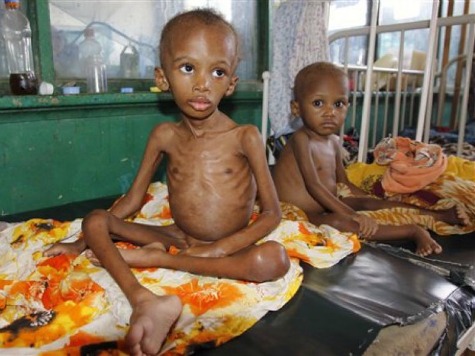
A report compiled by 22 humanitarian aid agencies warns that 50,000 children–one in seven–in Somalia are at the brink of death thanks to hunger. Additionally, the nation faces yet another potential famine as it strives to recover from a 2011 drought-fueled famine that continues to cripple the nation.
The report notes that only 30% of the country has access to clean drinking water, and less than 25% of citizens have access to hygienic toilet facilities. In addition to the fact that nutrition is increasingly difficult to come by, the lack of access to adequate sanitation facilities are perpetuating cycles of disease, including polio, which has recently made a resurgence in the African nation. The World Health Organization designated the polio situation a “public health emergency” this week, not just in Somalia but transfers of the virus “from Pakistan to Afghanistan, Syria to Iraq and Cameroon to Equatorial Guinea.”
“The sad truth is that these statistics from Somalia are better than previous years, so this is celebrated as a success,” the report adds. As astronomical as the 50,000 children statistic is, more than 250,000 people died in 2011 due to famine, and the survivors are widely displaced both within Somalia and the greater region.
The BBC notes that another significant factor fueling the famine is the inability of humanitarian groups to bring food and aid to many living deeply within Islamist radical controlled territory. Much of Somalia is controlled by al-Shabab, a group with ties to al-Qaeda that seeks to impose a radical version of Sharia law. The group, the BBC adds, “had banned several international aid agencies from distributing food in its territory.”
When aid does go through, it often falls into the wrong hands. As Breitbart London’s Nick Hallett notes, a leaked United Nations report revealed by The Daily Mail found that there was a “high level of systematic abuses” in Somalia, including the use of humanitarian aid to arm members of al-Shabab.
Observers note that while Somalia appears only marginally better than it was during the 2011, there are signs that the situation could worsen at any time. Andrew Lanyon, head of the Somalia Resilience Programme, told The Guardian that the situation is one in which there is “an early warning that has ingredients of a perfect storm,” and that “immediate response to avert disaster will result in spending as little as a third of the cost of responding when [the crisis] peaks.” Geno Teofilo, Oxfam’s spokesman for Somalia, echoed the sentiment: “The world is failing Somalia again. The crisis there could become a catastrophe. The situation now is similar now to 2011 in many respects.”

COMMENTS
Please let us know if you're having issues with commenting.